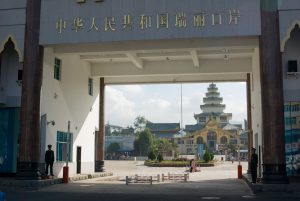Amid Myanmar’s COVID-19 second wave, the Chinese and Thai authorities have been unilaterally applying restrictive policies at major border gates. Of concern for the Myanmar side, the measures – which are mainly detrimental to its traders – have been imposed without consultation, pointing to a lack of trust in the country’s ability to contain its coronavirus outbreak. Moreover, while the spirit of the policies is to contain COVID-19, China’s policies in particular create business opportunities for Chinese traders and have protectionist undertones.
On October 11, the Chinese authorities unexpectedly tripled fees for substitute drivers at the Muse-Ruili border crossing. Muse, in northern Shan State, and Ruili in China’s Yunnan Province, are separated by the shallow Shweli River. The border point is Myanmar’s main gateway to China, accounting for 83 percent of its border trade with China, and almost half of the country’s total border trade.
The driver substitute policy has been in place since April, and requires Myanmar truck drivers to hand over their vehicles to Chinese drivers at the border in order for goods to be delivered to their final destination in China. The trucks are then returned to the Myanmar drivers at the border. The policy expectedly led to trade bottlenecks. In July, it was reported that trucks were queueing for up to eight days before being able to cross the border, and China-Myanmar border trade fell by $188 million between October 1, 2019 and August 28 in the 2019/20 financial year, when compared to the same period last year.
The substitute policy itself is understandable in light of the COVID-19 outbreak, particularly given that Myanmar has been experiencing a resurgence of the disease since mid-August. On October 21, Myanmar recorded 1,194 more COVID-19 cases and 27 deaths due to the disease, bringing its totals to 39,696 cases and 972 deaths. In general, there have been few cases in northern Shan State, even though the entire city of Ruili went into lockdown on September 14 after three COVID-19 cases were reported in the city, with the Chinese authorities claiming transmission was due to illegal border crossings by Myanmar citizens. Border trade was halted until September 26, after Ruili’s entire population of 210,000 had undergone two rounds of testing for COVID-19.
Less clear, however, is why the fees were unexpectedly more than tripled from 30 Yuan ($4.46) to 100 Yuan ($14.86). According to Myanmar media outlet 7DayDaily, Chinese officials said the fees were raised as a COVID-19 containment measure, although it was unclear exactly how the price hike would achieve that aim. More likely was that the management of substitute drivers has shifted from the Chinese authorities to a private company.
The measure came after a notification from the Chinese authorities on August 25, requiring that Myanmar-owned depots located in Ruili, where around 100 are in operation, have a Chinese shareholding amounting to 50 percent. While such joint venture requirements are common globally, Myanmar depot owners were given only 10 days to change their ownership structure or would not be permitted to extend their operating licenses. This led to calls from the Myanmar Ministry of Commerce and trading associations in Muse for the policy to be suspended so that negotiations could be carried out.
The policy was not suspended, and depots have since closed down and shifted back to Myanmar. This move will likely slow trade and is particularly detrimental to Myanmar traders given the ongoing pandemic. If goods could be stored in a depot on the Chinese side as before, they could be dispatched as soon as an order was made. If stored on the Myanmar side, however, there is less certainty about precisely when the goods can cross the border due to checks and the driver substitute policy.
It is not only China that has unilaterally implemented border policy changes. On September 17, the Thai authorities at the Tachileik-Mae Sai border gate – where a driver substitute polity is also in place – announced that only six trucks would be permitted to enter Thailand each day due to the COVID-19 outbreak in Myanmar. The Myanmar side claimed the Thai authorities implemented the restrictions without first consulting Myanmar officials. An agreement was then struck on September 30 to reopen the border, with the Kyaingtong-Tachileik Border Trade Merchants Association Chair U Sai Sai quoted as saying that the Thai side had apologized and would discuss restrictions bilaterally in the future.
The unilaterally applied restrictions point to a lack of trust among Thai and Chinese border authorities in Myanmar’s ability to control or properly monitor its outbreak. The Chinese policies also have unexplained protectionist undertones and will lead to the loss of business for some traders. Myanmar officials have been claiming for months that a government-to-government agreement is being sought between the country and its neighbors regarding COVID-19-related border restrictions, although no agreement has been struck so far. Of concern is the fact that while the Thai authorities have signaled a readiness to negotiate on future policies, the Chinese authorities appear less willing to engage.
Shah Suraj Bharat is a Yangon-based transport infrastructure analyst for FMR Research. The views expressed are his own. He tweets at @shahsurajbharat.

































